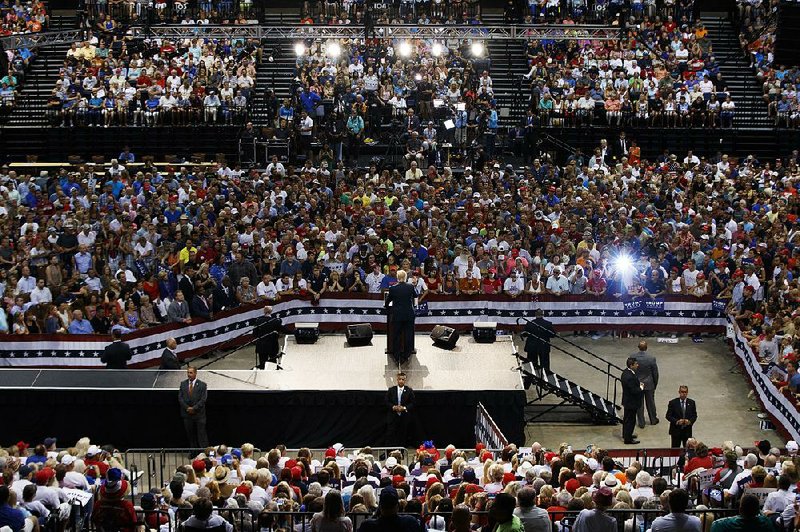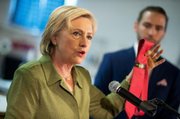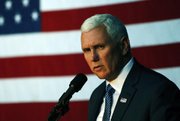DAYTONA BEACH, Fla. -- Republicans' frustration with Donald Trump continued Wednesday as party leaders on Capitol Hill and inside New York's Trump Tower worked to persuade their presidential nominee to abandon some of his tactics.
RELATED ARTICLE
http://www.arkansas…">Sanders backers to get travel aid
FULL ELECTION COVERAGE
Republican National Committee Chairman Reince Priebus appealed to the New York businessman's adult children to help as new signs of trouble were noted for the campaign.
And as Trump held off endorsing House Speaker Paul Ryan in Wisconsin's Republican primary, Trump's running mate enthusiastically endorsed Ryan on Wednesday. Indiana Gov. Mike Pence called the speaker a "longtime friend" and "strong conservative leader."
Trump dismissed suggestions Wednesday that GOP frustration was hurting his campaign, even as he contemplated an Election Day loss.
"Wouldn't that be embarrassing to lose to crooked Hillary Clinton? That would be terrible," he said during a campaign stop in battleground-state Florida. He also insisted of the GOP, "We've never been this united."
Trump's campaign has been beset by internal discord, including growing concern about his general-election preparedness and a lack of support from Republican leaders, according to two people familiar with the organization's inner workings.
One of the people said Trump privately blames his staff for failing to quiet the backlash from his own party after he criticized an American Muslim family whose son, a U.S. Army captain, was killed in Iraq.
The inner tension comes as Priebus and a handful of high-profile Trump allies consider whether to confront the candidate directly to encourage a new approach after a series of his startling stances and statements. In the aftermath of his criticism of the Khan family, Trump irritated Priebus and other party leaders by refusing to endorse Ryan for re-election.
The officials, including one with direct knowledge of Priebus' thinking, spoke on condition of anonymity about the internal strategy after one of the most tumultuous weeks of Trump's presidential campaign.
The most powerful Republicans in Washington and New York's Trump Tower concede that things will not change unless it's Trump wish.
"The candidate is in control of his campaign," campaign chairman Paul Manafort told Fox News. "And I'm in control of doing the things that he wants me to do in the campaign."
Democratic presidential nominee Hillary Clinton, meanwhile, kept up her assault on Trump's business practices, holding up a Trump-branded tie as she spoke at the Knotty Tie Co. in battleground-state Colorado.
"I really would like him to explain why he paid Chinese workers to make Trump ties," Clinton told employees in Denver, "instead of deciding to make those ties right here in Colorado."
Trump blamed the media -- "so dishonest" -- for growing criticism over his recent statements and his unwillingness to accept guidance from senior advisers.
Privately, however, Trump has concerns about his own team, according to sources.
He was deeply upset when GOP leaders "took the other side" during his quarrel with the Khan family, one person said, and blames his campaign staff for not keeping top Republicans in line. Another person said Trump is irritated that general-election planning in battleground states isn't further along with three months until Election Day.
The internal tension is complicated by Trump's frequent travels without his senior advisers and his children, who wield significant influence in the campaign, the people close to the campaign said.
There's been no follow-through on a plan presented earlier this summer to have one of the children or son-in-law Jared Kushner travel with Trump most of the time.
While the children have made some appearances with their father -- for instance, Eric Trump attended Tuesday's rally in Virginia -- work obligations and other commitments, including a hunting trip that the sons have lined up, have posed scheduling conflicts.
"I would say in the last couple of weeks, he has been remarkably underperforming, and we'll see whether or not he can take a deep breath and learn these lessons," former House Speaker Newt Gingrich told Fox Business Network.
Ryan support
Pence, the GOP vice presidential nominee, tried to put a better face on the situation during a phone interview with Fox.
Pence said he spoke with Trump on Wednesday morning "about my support for Paul Ryan and our longtime friendship. He strongly encouraged me to endorse Paul Ryan in next Tuesday's primary. And I'm pleased to do it. But look, this is all part of a process of bringing a party together" after a competitive nominating fight, he said.
"I believe we need Paul Ryan in leadership in the Congress of the United States to rebuild our military, to strengthen our economy and to ensure that we have the kind of leadership in this country that will make America great again," he said.
Trump stunned Republicans by telling The Washington Post in an interview Tuesday that he wasn't ready to endorse Ryan. Ryan has backed Trump, despite their deep differences on policy and temperament, and has encouraged other Republicans to unite behind the party's nominee.
But in a phone conversation Wednesday morning between Pence and Trump, according to someone with knowledge of the call, Trump raised his Post interview. Pence said he understood where Trump was coming from, but personally was inclined to support Ryan. Trump, without hesitation, agreed, the person said.
Ryan is facing a primary challenge from businessman Paul Nehlen, who is running on a populist platform similar to that of Trump.
Nehlen went to Trump's defense this week after Ryan implicitly criticized the Republican nominee for disparaging the Khans, whose son Humayun Khan was killed in Iraq. That prompted Trump to send a Twitter message thanking Nehlen. And on Tuesday, Trump told the Post that Nehlen was "running a very good campaign."
Wisconsin Gov. Scott Walker and Wisconsin's U.S. Sen. Ron Johnson indicated that they would not join Trump at a scheduled appearance in Green Bay this week. And Wednesday, Walker posted a picture of himself with Ryan on Twitter, writing: "We stand with Paul Ryan!"
Priebus, the Republican National Committee chairman and a Wisconsin native, is said to be livid over Trump's remarks about Ryan and is considering several options to show his public support for the Wisconsin congressman.
Priebus is debating the best way to demonstrate solidarity with Ryan, ranging from making a formal endorsement to sending an email publicly stating his support, said three people who have knowledge of Priebus' internal discussions.
Priebus has not yet had a direct conversation with Trump, according to people close to him, but he has been in contact with some of Trump's children.
Intelligence briefings
In Washington, a day after President Barack Obama called Trump "unfit" to hold the nation's highest office, the White House said it has notified the businessman's campaign as well as that of Clinton that their intelligence briefings can get underway.
"This administration is committed to working with both the Democratic nominee and the Republican nominee," White House spokesman Josh Earnest said at a briefing Wednesday. White House Chief of Staff Denis McDonough called both campaigns to tell them that the briefings are available, Earnest said. He didn't say when those calls were placed.
The administration is adhering to law and convention for the transition to the next president in January, rather than heeding calls by Democrats and Republicans who have questioned whether the candidate they oppose should be allowed access to some of the nation's most sensitive information.
Trump last week suggested that Russia hack into Clinton's emails. Senate Democratic leader Harry Reid suggested in an interview with The Huffington Post last week that the intelligence community give Trump fake briefings, to protect national secrets. Republicans have meanwhile said Clinton's handling of her email as secretary of state, described as "extremely careless" by FBI director James Comey, should disqualify her from receiving classified briefings.
There is a formal White House transition process that's directed in part by a law Obama signed this year. The process includes top-secret intelligence briefings, funding and office space provided by the federal government after the parties' nominating conventions, which concluded last week.
The briefings have not yet begun, Earnest said, and must be requested by the candidates.
Iran $400 million
The presidential campaign Wednesday shifted focus to a cash payment of $400 million that was delivered to Iran in January.
Trump seized on the money transfer as a sign of what he called the administration's failed foreign policy -- prompting a forceful White House rejection.
Earnest said the payment to Iran was part of the resolution of a long-standing financial dispute between the two nations and was delivered on pallets, in cash made up of euros, Swiss francs and other non-U.S. dollar currencies because the two nations do not have a banking relationship.
Earnest also denounced the assertions from some Republicans that the $400 million delivered to Iran was ransom for four Americans released at the time of the money transfer. He compared the statements from Republicans with those of conservatives in Iran who oppose the nuclear agreement.
In January, the Arkansas Democrat-Gazette reported that the payment covered a claim long pending before an international tribunal in The Hague, Netherlands, that was set up to resolve disputes between the United States and Iran after the 1979-81 Iranian hostage crisis.
The sum of $400 million, plus $1.3 billion in interest, was agreed upon to settle claims over the money that Iran paid decades ago to buy weapons from the United States that were never delivered because Iran's revolution broke out.
Earnest dismissed Wednesday's article in The Wall Street Journal about the details of the cash payment as a "6-month-old news story" that is being pushed by opponents of the president's nuclear deal with Iran.
"It's an indication of just how badly opponents of the Iran deal are struggling to justify their opposition to a successful deal," Earnest said.
Trump posted Wednesday on Twitter that the payments amount to a scandal for Obama and Clinton, the former secretary of state.
"Our incompetent Secretary of State, Hillary Clinton, was the one who started talks to give 400 million dollars, in cash, to Iran. Scandal!" Trump wrote.
Clinton was secretary of state from 2009-13. Clinton initiated last year's Iran nuclear deal that was finalized by Secretary of State John Kerry. The separate negotiations that resulted in the $400 million payment began in 1981.
U.S. Sen. Marco Rubio, R-Fla., who has long been a critic of the Iran nuclear deal, argued that the cash sent to Iran amounted to a ransom payment to get the detained Americans home.
"Obama administration sent plane load of cash to #Iran as ransom as part of deal on hostages. Just unreal," Rubio wrote on Twitter.
U.S. Sen. Ted Cruz, R-Texas, said in a statement that the cash payment shows that the Iran nuclear deal "is nothing but a series of bribes and secret agreements that will do nothing to prevent Iran from reaching nuclear capability, yet will provide funding for their sponsorship of terrorism and encourage them to detain more of our citizens."
The office of U.S. Sen. Tom Cotton, R-Ark., said Wednesday that the Arkansan sent a letter to Kerry and Treasury Secretary Jack Lew demanding answers about the $400 million payment.
"Since January, Senator Cotton has repeatedly asked the Administration how and in what currencies the payment was made. None of its responses -- to questions posed in a May 25, 2016 Banking Committee hearing as well as in additional written questions -- indicated that the payment was made in cash," Cotton's office said in a news release.
Cotton discussed the payment Wednesday, saying in an interview with The Sentinel-Record in Hot Springs, "We've either been stonewalled or administration officials tell me the truth and other senators the truth privately, and then lie to the American people. I can't put it any more bluntly than that. They hide behind the classification of certain information."
Earnest denounced allegations as "a false claim that this is somehow a ransom payment."
He accused people like Rubio and Trump of seizing on the new details about the cash transfer to continue trying to undermine the nuclear agreement.
"They are once again in a position of making the same argument as hard-liners in Iran in an attempt to undermine the nuclear agreement," Earnest said. "I understand the interest in details that make a more colorful story."
He added: "Critics of the deal have lost this argument."
Information for this article was contributed by Steve Peoples, Jonathan Lemire, Julie Pace, Jill Colvin and staff members of The Associated Press; by Ashley Parker, Maggie Haberman, Jonathan Martin and Noah Remnick of The New York Times; by Jenna Johnson of The Washington Post; by Angela Greiling Keane, Toluse Olorunnipa and Justin Sink of Bloomberg News; and by Steven Mross of The Sentinel-Record.
A Section on 08/04/2016


